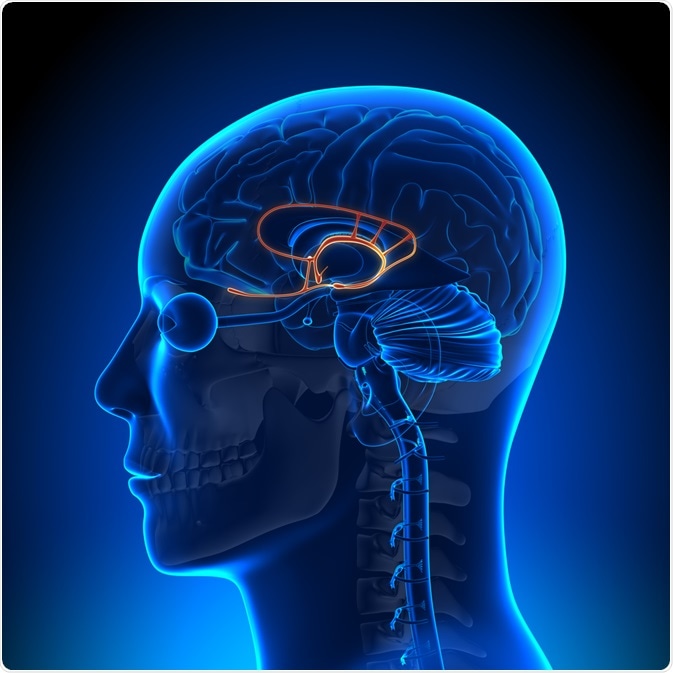The limbic system is a group of specific brain structures associated with memory and emotional behaviors. In 1978, French anatomist Paul Broca first coined the term “limbic lobe” to describe the part of the cerebral cortex that forms a limbus, the Latin word for "rim", around the corpus callosum - the large fiber bundle connecting the cortices of two cerebral hemispheres.

Image Credit: decade3d - anatomy online/Shutterstock
Two vital structures of this region are the cingulate gyrus and parahippocampal gyrus. However, the involvement of this specific brain region in controlling emotional behaviors was first described by the American physician, James Papez, in 1937.
He proposed a brain circuit, known as the Papez circuit, which showed that the hypothalamus and cingulate gyrus are interlinked to the anterior nucleus of the thalamus through the projections from the mammillary bodies, a part of the posterior hypothalamus. The anterior nucleus of the thalamus subsequently projects to the cingulate gyrus, which further projects to the hippocampus. Finally, the hippocampus projects back to the hypothalamus via the fornix, which is a large fiber bundle connecting the hypothalamus and hippocampus.
Afterward in 1952, another American physician and neuroscientist, Paul D. MacLean, first introduced the term “limbic system” to portray the entire neural hub for emotion.
Largely, the limbic system comprises the following brain structures:
- Limbic cortex – cingulate gyrus and parahippocampal gyrus
- Hippocampal formation – dentate gyrus, hippocampus, and subicular cortex
- Amygdala
- Septal area
- Hypothalamus
Long-term memory is a type of memory that is encoded in the brain for years. It can be divided into two major groups:
- Explicit or declarative memory refers to the memories that are consciously recalled as episodes of life. It depends primarily on the medial temporal lobe and hippocampus, though there is also a theory that the amygdala plays a role in this.
- Implicit or procedural memory refers to the memories that are responsible for learning and remembering motor and cognitive skills. It depends primarily on the basal ganglia and cerebellum.
Emotional learning has a strong influence on memory formation and its long-term consolidation. Consolidation is considered a slow process, during which the memories are not yet considered permanently set. This might allow the opportunity for an emotional reaction related to an event to influence its storage and increase the likelihood of it being remembered.
The amygdala, a brain structure that is primarily involved in emotional learning, regulates various stages of memory formation in other brain regions, such as the hippocampus and prefrontal cortex. It is associated with the consolidation and retrieval of emotional memories. However, the medial temporal lobe structures including the hippocampus, entorhinal cortex, and perirhinal cortex in conjunction with the amygdala play a pivotal role in declarative memory formation, memory consolidation, contextual fear memory formation, and hippocampus-dependent higher-order conditioning practices, such as trace conditioning, and conditional discrimination learning. In addition, the amygdala influences the hypothalamic-pituitary-adrenal axis to release stress hormones that subsequently regulate memory consolidation as well as storage in the cerebellum, sensory neocortex, and medial temporal lobe.
Consolidation of any new information as a long-term memory mainly occurs during sleep. Crosstalk between the neocortex and hippocampus also plays an important role in learning and memory formation. Activated nerve cells of these two brain regions in the trained rats have been shown to generate high-frequency electrical signals simultaneously during sleep, suggesting that these regions function in harmony to regulate the learning process of a new task and subsequent memory consolidation.
Besides memory consolidation, retrieval of contextual memory is also regulated by the interplay between the amygdala, hippocampus, and prefrontal cortex. In contrast to the dorsal or posterior hippocampus, which encodes memories of specific objects and their location in a particular context, the ventral or anterior hippocampus participates in memory formation that strongly differentiates between contexts. Such contextual memories from the ventral or anterior hippocampus are passed on to the prefrontal cortex, which subsequently facilitates the retrieval of specific object-related memories through the perirhinal and lateral entorhinal cortex.
Neuroanatomy S1 E4: Hypothalamus and Limbic System #neuroanatomy #ubcmedicine
References
-
Purves, D. et al. (2001) "The Limbic System", Sinauer Associates, p. Available at: https://www.ncbi.nlm.nih.gov/books/NBK11060/ (Accessed: 24 August 2021).
-
LaBar, K. and Cabeza, R. (2006) "Cognitive neuroscience of emotional memory", Nature Reviews Neuroscience, 7(1), pp. 54-64. doi: 10.1038/nrn1825.
-
RajMohan, V. and Mohandas, E. (2007) "The limbic system", Indian Journal of Psychiatry, 49(2), p. 132. doi: 10.4103/0019-5545.33264.
-
Preston, A. and Eichenbaum, H. (2013) "Interplay of Hippocampus and Prefrontal Cortex in Memory", Current Biology, 23(17), pp. R764-R773. doi: 10.1016/j.cub.2013.05.041.
-
Brain activity ripples linked to creation of long-term memories (2017). Available at: https://www.nih.gov/news-events/nih-research-matters/brain-activity-ripples-linked-creation-long-term-memories (Accessed: 24 August 2021).
Further Reading
Last Updated: Dec 20, 2022